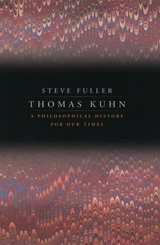2 books about Thomas Kuhn

Thomas Kuhn
A Philosophical History for Our Times
Steve Fuller
University of Chicago Press, 2000
Thomas Kuhn's The Structure of Scientific Revolutions is one of the best known and most influential books of the twentieth century. Whether they adore or revile him, critics and fans alike have tended to agree on one thing: Kuhn's ideas were revolutionary. But were they?
Steve Fuller argues that Kuhn actually held a profoundly conservative view of science and how one ought to study its history. Early on, Kuhn came under the influence of Harvard President James Bryant Conant (to whom Structure is dedicated), who had developed an educational program intended to help deflect Cold War unease over science's uncertain future by focusing on its illustrious past. Fuller argues that this rhetoric made its way into Structure, which Fuller sees as preserving and reinforcing the old view that science really is just a steady accumulation of truths about the world (once "paradigm shifts" are resolved).
Fuller suggests that Kuhn, deliberately or not, shared the tendency in Western culture to conceal possible negative effects of new knowledge from the general public. Because it insists on a difference between a history of science for scientists and one suited to historians, Fuller charges that Structure created the awkward divide that has led directly to the "Science Wars" and has stifled much innovative research. In conclusion, Fuller offers a way forward that rejects Kuhn's fixation on paradigms in favor of a conception of science as a social movement designed to empower society's traditionally disenfranchised elements.
Certain to be controversial, Thomas Kuhn must be read by anyone who has adopted, challenged, or otherwise engaged with The Structure of Scientific Revolutions.
"Structure will never look quite the same again after Fuller. In that sense, he has achieved one of the main aims of his ambitious and impressively executed project."—Jon Turney, Times Higher Education Supplement
"Philosophies like Kuhn's narrow the possible futures of inquiry by politically methodizing and taming them. More republican philosophies will leave the future open. Mr. Fuller has amply succeeded in his program of distinguishing the one from the other."—William R. Everdell, Washington Times
Steve Fuller argues that Kuhn actually held a profoundly conservative view of science and how one ought to study its history. Early on, Kuhn came under the influence of Harvard President James Bryant Conant (to whom Structure is dedicated), who had developed an educational program intended to help deflect Cold War unease over science's uncertain future by focusing on its illustrious past. Fuller argues that this rhetoric made its way into Structure, which Fuller sees as preserving and reinforcing the old view that science really is just a steady accumulation of truths about the world (once "paradigm shifts" are resolved).
Fuller suggests that Kuhn, deliberately or not, shared the tendency in Western culture to conceal possible negative effects of new knowledge from the general public. Because it insists on a difference between a history of science for scientists and one suited to historians, Fuller charges that Structure created the awkward divide that has led directly to the "Science Wars" and has stifled much innovative research. In conclusion, Fuller offers a way forward that rejects Kuhn's fixation on paradigms in favor of a conception of science as a social movement designed to empower society's traditionally disenfranchised elements.
Certain to be controversial, Thomas Kuhn must be read by anyone who has adopted, challenged, or otherwise engaged with The Structure of Scientific Revolutions.
"Structure will never look quite the same again after Fuller. In that sense, he has achieved one of the main aims of his ambitious and impressively executed project."—Jon Turney, Times Higher Education Supplement
"Philosophies like Kuhn's narrow the possible futures of inquiry by politically methodizing and taming them. More republican philosophies will leave the future open. Mr. Fuller has amply succeeded in his program of distinguishing the one from the other."—William R. Everdell, Washington Times
[more]

World Changes
Thomas Kuhn and the Nature of Science
Paul Horwich
University of Pittsburgh Press, 2010
Thomas Kuhn is viewed as one of the most influential (and controversial) philosophers of science, and this re-release of a classic examination of one of his seminal works reflects his continuing importance. In World Changes, the contributors examine the work of Kuhn from a broad philosophical perspective, comparing earlier logical empiricism and logical positivism with the new philosophy of science inspired by Kuhn in the early 1960s. The nine chapters offer interpretations of his major work The Structure of Scientific Revolutions and subsequent writings. The introduction outlines the significant concepts of Kuhn's work that are examined and is followed by a brief appraisal of Kuhn by Carl Hempel. The chapters discuss topics that include: a systematic comparison of Kuhn and Carnap viewing similarities and differences; the disputation of absolute truth; rational theory evaluation and comparison; applying theory to observation and the relation of models in a new conceptualization of theory content; and interpreting Kuhn's plurality-of-worlds thesis. The volume also presents four historical papers that speak to Kuhn's views on lexical structures and concept-formation and their antecedents. The afterward, by Kuhn himself, reviews his own philosophical development, his thoughts on the dynamics of scientific growth, and his response to issues raised by the contributors and other interpreters of his work.
[more]
READERS
Browse our collection.
PUBLISHERS
See BiblioVault's publisher services.
STUDENT SERVICES
Files for college accessibility offices.
UChicago Accessibility Resources
home | accessibility | search | about | contact us
BiblioVault ® 2001 - 2024
The University of Chicago Press









